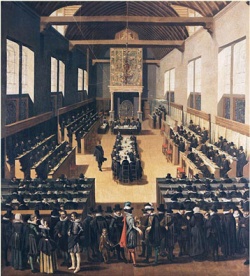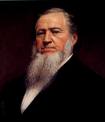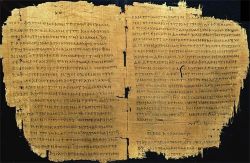 The Third and Fourth Main Points of Doctrine
The Third and Fourth Main Points of Doctrine
Human Corruption, Conversion to God,
and the Way It Occurs
Article 1: The Effect of the Fall on Human Nature
Man was originally created in the image of God and was furnished in his mind with a true and salutary knowledge of his Creator and things spiritual, in his will and heart with righteousness, and in all his emotions with purity; indeed, the whole man was holy. However, rebelling against God at the devil's instigation and by his own free will, he deprived himself of these outstanding gifts. Rather, in their place he brought upon himself blindness, terrible darkness, futility, and distortion of judgment in his mind; perversity, defiance, and hardness in his heart and will; and finally impurity in all his emotions.
_______________________________________________
As William Shakespeare once said, “that word 'grace' in an ungracious mouth is but profane” (King Richard II, Act II, Scene III). In the previous two heads of doctrine, the Synod of Dort carefully dealt with the fact that our salvation begins with something good in God (his love toward lost and fallen sinners), and not something good in the creature (foreseen faith or obedience). And having demonstrated from Scripture that God directs his saving grace to the specific individuals he intends to save–not to the world generically or impersonally–the Canons now move on to turn attention to the fact of human sinfulness, and how it is that the saving merits of Jesus Christ are applied to God’s elect.
Approaching this matter in both a logical and redemptive-historical order, the Canons move from God’s decree in eternity past, to Christ’s redemptive work for his people on Calvary’s cross, and then finally to the way in which the benefits of Christ’s doing and dying become ours. This is what we as Reformed Christians mean when we speak of “redemption decreed, redemption accomplished and redemption applied.” As we have seen, this is the pattern set out by the Apostle Paul in Ephesians 1:3-14.
Without a sufficient awareness of the sinful human condition according to the Scriptures, there can be no real appreciation of God’s graciousness to us. Unless we come to realize the gravity and depth of our offences against the infinitely holy and righteous God, and unless we understand that we deserve his eternal and unending punishment because of our sins, we cannot even begin to appreciate that word “grace.” That word `grace’ is indeed profanity on the lips of one whose self-righteousness is not yet crushed by the awareness of their sin and their eternal peril.
It is only when we see ourselves as we truly are—sinful and under God’s just condemnation—that we begin to understand the wonder of the fact that God has chosen us in Christ from before the foundation of the world, and that God sent Jesus Christ both to die for our sins, as well as to fulfill the righteous requirements of the law, so that we can be justified and adopted into God’s family. We who were strangers and aliens, instead become heirs to all the glorious promises of God (cf. Ephesians 2:11-22).
Before we proceed further, the canons remind us that we need to stop and back-up a step, because we cannot understand the present sinful human condition if we do not first of all understand the human condition as it was before the Fall. Men and women were not created sinful, nor was death simply the result of human finitude. On the contrary, death is a result of Adam’s sin and is the fruit of the curse that comes upon the human race because of our collective rebellion against our creator in Adam.
When God created Adam from the dust of the ground and breathed life into him, Adam became a living being. According to Genesis 1:26-27, Adam was created in God’s image. In fact, the creation account ends with these words, “And God saw everything that he had made, and behold, it was very good.” The creation of Adam in God’s image is the culmination of God’s creative activity, and is the high point and crowning glory of all that God has made.
This notion of Adam being God’s “image-bearer” entails a number of important things connected with what is called “original righteousness,” that is, the righteousness possessed by Adam before the Fall. According to the Apostle Paul’s comments in Ephesians 4:24, “original righteousness” includes both “righteousness” and “holiness.” Adam was created without sin and was “innocent,” in the sense that sin was not a necessary part of his finitude and humanity, nor was his sin connected to the fact that Adam was created from the dust, i.e., that he had material form and a body.
In Colossians 3:10 Paul adds “knowledge” to righteousness and holiness, an indication that in the garden (before the fall), Adam who enjoyed intimate fellowship with God. He certainly had true “knowledge” of God’s will, and was fully aware of God’s righteous requirements under the covenant of works, namely, God’s command not to eat of the tree of the knowledge of Good and Evil. This is what the Canons mean when they declare that “Man was originally created in the image of God and was furnished in his mind with a true and salutary knowledge of his Creator and things spiritual, in his will and heart with righteousness, and in all his emotions with purity; indeed, the whole man was holy.” The creation of Adam is the culmination of the creation account.
It is easy to grasp the fact that someone who falls from a great height is likely to suffer serious harm upon landing. A skydiver—who’s parachute fails to open—will suffer far greater injuries than one who falls three feet to earth from a step-ladder. So it is in the Fall of Adam. Adam was created to be like God in every way that a creature can be like God. By virtue of being created in God’s image, Adam possessed all of the so-called “communicable” attributes of God; things such as love, justice, holiness, truth, righteousness, and so on. Created in the image of God and like God in every way that a creature be like God—the very pinnacle of God’s creative activity—Adam stood at the height of creation. He was appointed by God to be king and vice-regent over all of creation. When Adam fell, he fell a great distance, and the consequences of that fall are indeed horrific for all of us. The fall unleashed upon Adam and all of creation, the twin principles of death and decay.
This point—that Adam’s fall brought horrific damage upon the race—has several very important theological ramifications. First, as the Canons note, “rebelling against God at the devil's instigation and by his own free will, [Adam] deprived himself of these outstanding gifts.” This means that Adam’s fall and its effects come about because of Adam’s sinful and intentional rebellion against God, not because of any defects inherent in Adam being created in God’s image. Sin and death comes from Adam’s fall, not from anything intrinsic to human nature. Adam fell a long, long, way and the damage is great.
Second, as the authors of the Canons go on to point out, this original righteousness of which we have been speaking was just one casualty of Adam’s rebellion. “Rather, in the place [of these outstanding gifts, Adam] brought upon himself blindness, terrible darkness, futility, and distortion of judgment in his mind; perversity, defiance, and hardness in his heart and will; and finally impurity in all his emotions.”
At this point we introduce the doctrine of “total depravity.” It has been said that this is a doctrine which the Reformed have not only taught with great vigor, but have often proven to be true! The doctrine of total depravity does not mean that human beings after the Fall are at all times as wicked as they possibly can be. The worst among Adam’s race do not continually rape, pillage, burn, spit at old ladies, or kick puppies. Total depravity means that as sinful men and women, fallen in Adam and consequently deprived of original righteousness, sin now effects us in our totality as human beings from the moment of conception. There is no part of human nature that is not tainted, stained, corrupted, and effaced by the effects of sin. Hence, we are “totally” depraved. We suffer from spiritual blindness to the things of God, and unless illumined by the Holy Spirit, the things of God remain hidden from us.
But this is not all that is in view. As fallen in Adam, the Scripture says our minds are now darkened (Ephesians 4:17-24), and we don’t think clearly nor do we fully grasp the things of God as they are revealed in creation and the Scriptures. This also means that we find ourselves in a continuous state of futility and frustration. Apart from the aid of divine grace, our sinful proclivities continually force us to attempt to deny those things that we know to be true about God, ourselves, and the world.
As sinners, we become intellectual schizophrenics. But the problem is not only intellectual, it is also moral. Since we are sinful in our very essence, we cannot stand to live in light of God’s revelation to us. As John puts it, men love darkness rather than light because their deed are evil (John 3:19). We prefer to live in the darkness where our wickedness goes on unnoticed. As the fallen children of Adam, we have no proper sense of judgment. We are not able to weigh matters from God’s perspective. Instead, we see things only through the grid of human sinfulness and self-centeredness.
In addition, we become perverted, twisting the good, the true, and the beautiful into the ugly, the false, and the erotic. Our hearts are hardened, not only to the things of God, but to the plight of our neighbors. We become indifferent and apathetic to those in need. The old-fashioned term for this is selfishness! We are now turned in on ourselves as Luther once put it. Even worse, we are incapable changing ourselves. Unless God acts upon us, no one will be saved.
The most important thing to consider in this context–when we are talking about the doctrine of sin and salvation–is that our wills are now enslaved to our sinful natures and passions, further impaired by our darkened understanding. This is an important point and the authors of the Canons conclude the list of the effects of human sinfulness by pointing this out. Although we are fallen, our wills still function and we make choices. The faculty of choice is certainly an important aspect of the essence of what it means to be human. But our wills are no longer free to choose the good, since the sinful, darkened, and rebellious human nature holds the will in bondage.
Therefore, all choices that we do make, are made from the perspective of our sinful depravity. This is what Reformed theologians mean when they speak of “total inability,” a subject which addressed in more detail in Article 3. Since our wills are held captive by the sinful nature, we do not, (indeed will not), choose to trust in Jesus Christ for the forgiveness of our sins. A bad tree cannot bear fruit in keeping with repentance. We do not embrace Christ and his gospel through faith, because we do not want to! Christ is repugnant to the fallen children of Adam. In order for us to come to faith in Christ, we must be changed from a bad tree into a good tree, and this is something only God can do—a point made in great detail under the first head of doctrine.
 Wednesday, January 14, 2009 at 07:23AM
Wednesday, January 14, 2009 at 07:23AM 










